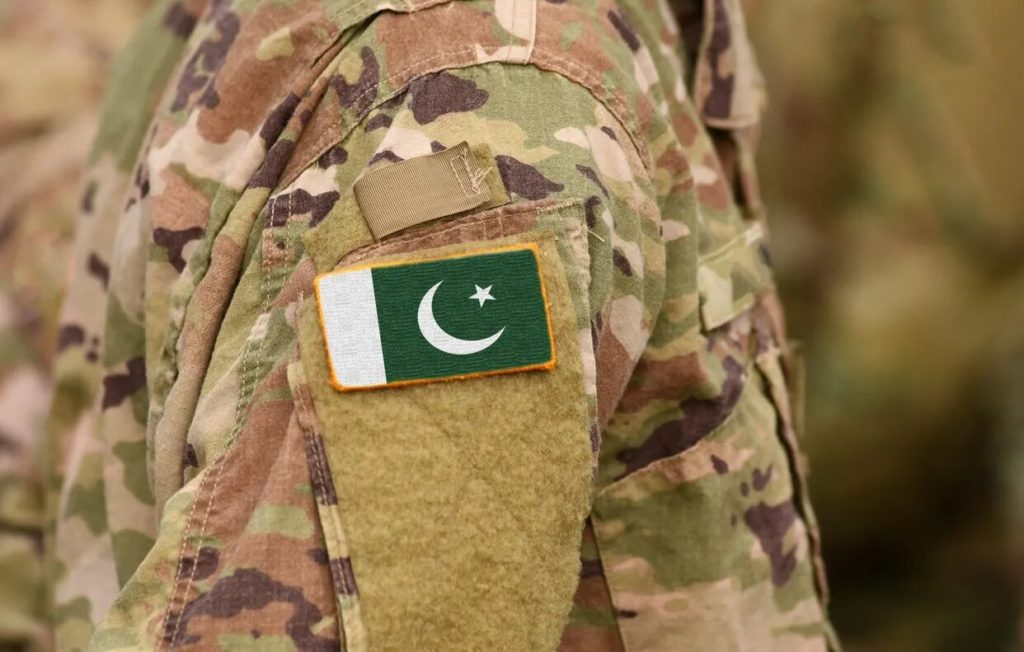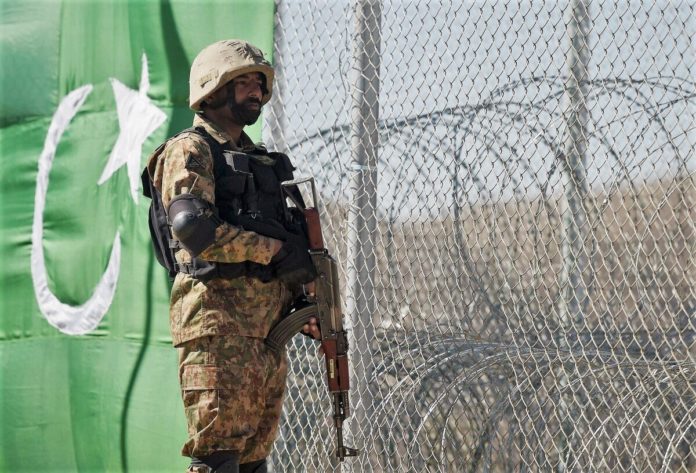In the Indian subcontinent, soldiering was a hereditary profession of certain groups. In the Hindu caste system, birth determined the individual’s assigned role. One was to perform the role of farmer, trader, religious leader, or soldier based on the membership of the community assigned that role by the society. This system was continued even among those Hindus who converted to Islam. The East India Company inherited this system and continued to recruit selected groups for the British Indian army. Self-identity of the group, higher social status accorded to the profession of soldiering and financial rewards for a loyal service ensured that successive generations flocked to the regimental colors. This trend continued after departure of the British in the successor Indian and Pakistan armies. In the Pakistan army, successive generations serve the colors. In the 1971 India-Pakistan war, several members of the families were proudly wearing the uniform.
Six Alam brothers were serving in all three services on eastern and western fronts. Shamim Alam (28 Cavalry) and Firoz Alam (33 FF) were serving in the Chamb sector, Zahir Alam (38 Cavalry) in western desert sector and Ijaz Alam (13 Lancers) was killed in action in the battle of Barapind. Mushtaq Alam was serving with the Pakistan Air Force (PAF) and Shimon Alam with Pakistan Navy.
Five Azim brothers from different branches of the army were honoring the uniform in 1971. Ijaz (Guides Cavalry & 11 Cavalry), Riaz (Baloch), Imtiaz (Engineers), Niaz (Artillery) and Aitzaz were defending different walls of the citadel.

One Dogar family sent all male members of the family that included father and six sons to defend the land and sea borders of the country on the eastern and western fronts. Major Mahboob Ali Dogar (6/12 Frontier Forces Rifles & Army Education Corps) was retired but recalled by army headquarters when war started. His two sons were serving in East Pakistan Captain (later Brigadier) Yasub Ali Dogar (Guides Infantry & SSG) was with SSG, and Captain (later Lieutenant Colonel) Shoaib Ali Dogar (Engineers) was in Mymensingh. Both brothers became prisoners of war. Lieutenant (later Vice Admiral & Vice Chief of Naval Staff) Mahmood Ali Dogar and Cadet (later Vice Admiral & Chief of Staff) Tayyab Ali Dogar were serving with the Pakistan Navy. Yusuf Ali Dogar was serving with Pakistan International Airlines and the Ministry of Defense requisitioned his services for the defense of Gwadar. Ayub Ali Dogar served with a Mujahid battalion.
Six brothers from a military family of Potohar region with several generation history of military service were answering to the call of duty. Their uncle Subedar Muhammad Yusuf was retired but was recalled and he was serving with East Pakistan Rifles where he was killed in action when Bengali troops mutinied. Their cousin Lieutenant (Brigadier) Shafiq ur Rahman (15 Punjab & Aviation) was serving on the western theatre. This is story of this family.
Lance Naik Alam Khan OBI (2 Punjab Regiment) served with the British Indian army. His two sons Sawar Noor Khan (7 Cavalry) and Risaldar Firoz Khan (7 Cavalry & 20 Lancers) proudly served with Indian cavalry. In 1971, Noor Khan’s six sons were defending Pakistan’s borders in both wings. Lieutenant Colonel (later Brigadier) Amir Muhammad Khan (3 Punjab, 34 Punjab & SSG) was commanding a battalion in East Pakistan, Major (Colonel) Surkhuru Khan (27 Punjab & 33 Punjab) was in Mymensingh theatre and recently commissioned Second Lieutenant (Lieutenant Colonel) Muhammad Imtiaz (31 Punjab) with barely two weeks of service was deployed in Sylhet area.
Captain (Brigadier) Ghulam Abbas Khan (27 Punjab, 45 Punjab & 54 Punjab; now 18 Sindh) was transferred to 54 Punjab a few days before the war and the unit was marked for deployment in East Pakistan. His commanding officer told him that as his three brothers were already serving in East Pakistan therefore, he was going to ask GHQ to post him out of battalion to a unit in West Pakistan. Abbas refused to be posted out replying that “Sir I have joined the army to fight and will remain with the battalion as the major fighting is in East Pakistan.” During this time, air and sea routes to the eastern wing were cut off and 53 Punjab was diverted to Shakargarh area on the western front. Abbas won gallantry award of Tamgha-e-Basalat and two Chiefs of Army Staff commendation cards. Captain (Major) Alam Khan (38 Punjab & SSG) was part of the SSG team deployed in the western desert area in support of 18 Division attack. In 1974, he was killed in action during the Balochistan insurgency. The sixth brother Warrant Officer Amir Abdullah Khan was serving with PAF in West Pakistan.
Lieutenant Colonel Yaqub Panwar of Army Services Corp (ASC) had two sons serving in East Pakistan. Captain (later Colonel) Akram Panwar was serving with 13 FF and Captain (later Brigadier) Aslam Panwar with 29 Cavalry. Both brothers became prisoners of war. Prisoners were asked to complete forms on arrival at the camp. Akram was at Ranchi camp and in the column of place of birth, he wrote Ranchi. The camp authorities thought that he was joking and asked him to explain. He told them that he was not joking and that his father was posted in Ranchi, and he was born in Combined Military Hospital (CMH) Ranchi. The camp authorities asked CMH to check their records and they found that in fact Akram was born there. CMH sent a cake to Akram as a goodwill gesture.
Three Kamal brothers were on the frontlines. Major Kazim Kamal (9 Punjab, SSG & East Pakistan Rifles) was killed in action in Tangail area fighting rebellious Bengali troops. His brother Commander Tariq Kamal was commanding a naval destroyer PNS Jahangir in East Pakistan that he brought to West Pakistan. Later, he became Chief of Naval Staff (1983-86). The third brother was Colonel Asad Kamal.
Brigadier Sher Ullah Beg was from Hunza and commissioned in 1943 from Indian Military Academy (IMA). He was from 18 Punjab Regiment and later served as Commandant of elite Special Services Group (SSG) 1968-71. His two sons were serving in the eastern theatre. Lieutenant Salar Beg of 22 Cavalry was serving with 3rd Independent Squadron and was killed in action one day before the ceasefire. His brother 2nd Lieutenant (Lieutenant Colonel) Salman Beg from 47th PMA course was serving with 18 Punjab. Their maternal uncle Major (later Lieutenant Colonel) Hadi Hussain (2 FF Guides Infantry) was also in the eastern theatre serving with 24 FF.

Three brothers were defending borders during the 1971 war. Colonel (later Brigadier) Ijaz (7 Punjab) was serving as Colonel Staff of Eastern Command and Major (Lieutenant Colonel) Iftikhar (8 Punjab) was in the eastern theatre while Major (Lieutenant Colonel) Imtiaz (Artillery) was serving in the western theatre. Three Akbar brothers, Lieutenant Colonel Salim Akbar, Brigadier Munir Akbar and Lieutenant General Naeem Akbar all from Punjab Regiment fought in the 1971 war.
Major General Iftikhar Janjua was GOC of 23 Division and was killed in a helicopter crash. His brother was Major (later Major General) Ijaz Amjad. Both brothers were from 10 Baloch Regiment.
Colonel Saif-ur-Rahman’s (6 FF) two sons Captain (Major) Shahid Rahman (29 Cavalry) and Second Lieutenant (Captain) Asad Rahman (32 Baloch & SSG) were both serving in East Pakistan. Lieutenant Colonel (later Major General) Khurshid (11 Cavalry) and his brother Major (Brigadier) Jamshed (24 Cavalry) were serving on the western front. Two Bangash brothers, Shakeel and Aqeel were serving with 15 Lancers.
The loss of the eastern wing in 1971 war overshadowed the sacrifices of soldiers and the challenging time of prisoners of war. The nation and the Army wanted to forget this episode and move on; this was a great disservice to the soldiers and their families and was especially unfair to those families who willingly sent multiple family members in harm’s way. Many gave the ultimate sacrifice and lay buried in unmarked graves in what was once East Pakistan, leaving a permanent void in the hearts of their loved ones. Junior officers and soldiers paid for the political and military failure of the high command. Soldiers are trained and equipped by the nation to use violence on behalf of the nation and are expected to give the ultimate sacrifice in the performance of their duties. Sacrifice of mothers, fathers, brothers, sisters, wives, and children of soldiers is rarely acknowledged.
“Soldiers can sometimes make decisions that are smarter than the orders they have been given.”
Acknowledgements: The author thanks Major Agha H. Amin, Brigadier Yasub Dogar, Brigadier Ghulam Abbas, Colonel Surkhuru Khan and Colonel Mahmud Beg for providing details about individual officers and their families.
All errors and omissions are author’s sole responsibility.






To add to the collection of this valuable information may I add two more names.
Two Baqar brothers of Pakistan Navy, elder one, Lt (Rear Admiral) Syed Ahmed Baqar and younger one Lt (Lt Cdr) Syed Muhammed Baqar also served Pakistan Navy during 71. Elder was serving in earstwhile East Pakistan during the war. He wears the feather of escaping to Malaysia with PNS Rahshahi, a gun boat, along with over 40 naval and air force personnel. He commanded and navigated the boat, a small craft, through difficult situations created by hostile war conditions to Penang, a Malaysian port, safely and unharmed. The second Baqar, Lt (Lt Cdr) Syed Muhammed Baqar served in the western waters of Pakistan.